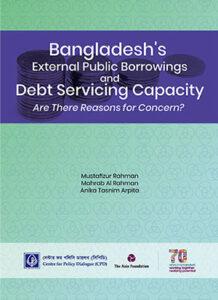 Bangladesh’s track record of debt servicing concerning public and publicly guaranteed (PPG) external debt has been impeccable till now. However, the study argues that in going forward there are reasons to be concerned about in this regard. There are of several reasons to this – rising foreign borrowings of recent years, more stringent terms of loans, higher share of non-concessional loans in the backdrop of Bangladesh’s middle-income graduation, significant depreciation of the BDT, delays in project implementation resulting in cost escalation and higher debt servicing obligations, grace period of some of the mega-projects coming to an end, and others. The study measures debt carrying capacity of Bangladesh by deploying a modified and calibrated version of the IMF-WB framework, and arrives at the conclusion that the country’s position in this respect has indeed weakened in recent years. The study offers a number of policy suggestions towards better PPG debt management by Bangladesh. The study argues that in going forward Bangladesh should be more selective in incurring borrowings for externally funded projects, take adequate preparation to carry out complex negotiations and develop the needed human resources and expertise in this regard, keep a sharp eye on the status of credit rating, forex exchange movements and forex reserve situation, and closely monitor the trends in private sector borrowings. The study underpins the need to develop a comprehensive debt management strategy with a view to strengthening Bangladesh’s debt carrying capacity and ensuring debt sustainability of the country.
Bangladesh’s track record of debt servicing concerning public and publicly guaranteed (PPG) external debt has been impeccable till now. However, the study argues that in going forward there are reasons to be concerned about in this regard. There are of several reasons to this – rising foreign borrowings of recent years, more stringent terms of loans, higher share of non-concessional loans in the backdrop of Bangladesh’s middle-income graduation, significant depreciation of the BDT, delays in project implementation resulting in cost escalation and higher debt servicing obligations, grace period of some of the mega-projects coming to an end, and others. The study measures debt carrying capacity of Bangladesh by deploying a modified and calibrated version of the IMF-WB framework, and arrives at the conclusion that the country’s position in this respect has indeed weakened in recent years. The study offers a number of policy suggestions towards better PPG debt management by Bangladesh. The study argues that in going forward Bangladesh should be more selective in incurring borrowings for externally funded projects, take adequate preparation to carry out complex negotiations and develop the needed human resources and expertise in this regard, keep a sharp eye on the status of credit rating, forex exchange movements and forex reserve situation, and closely monitor the trends in private sector borrowings. The study underpins the need to develop a comprehensive debt management strategy with a view to strengthening Bangladesh’s debt carrying capacity and ensuring debt sustainability of the country.
Authors: Mustafizur Rahman,Mahrab Al Rahman and Anika Tasnim Arpita
Publication Period: July 2024
ISBN: 978-984-98096-9-2


